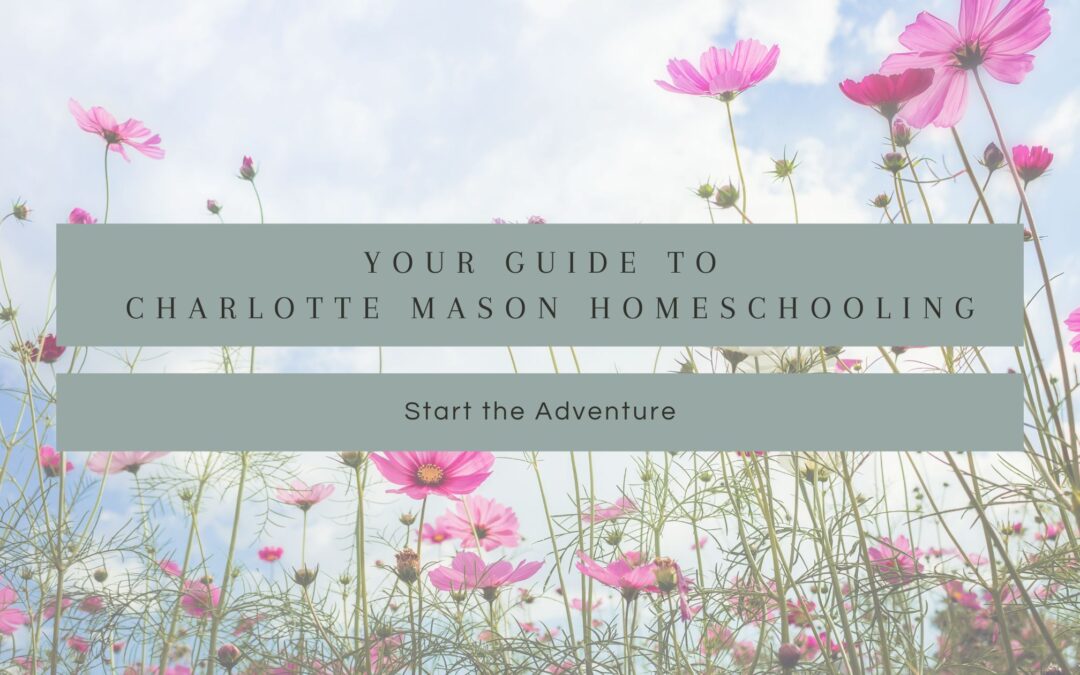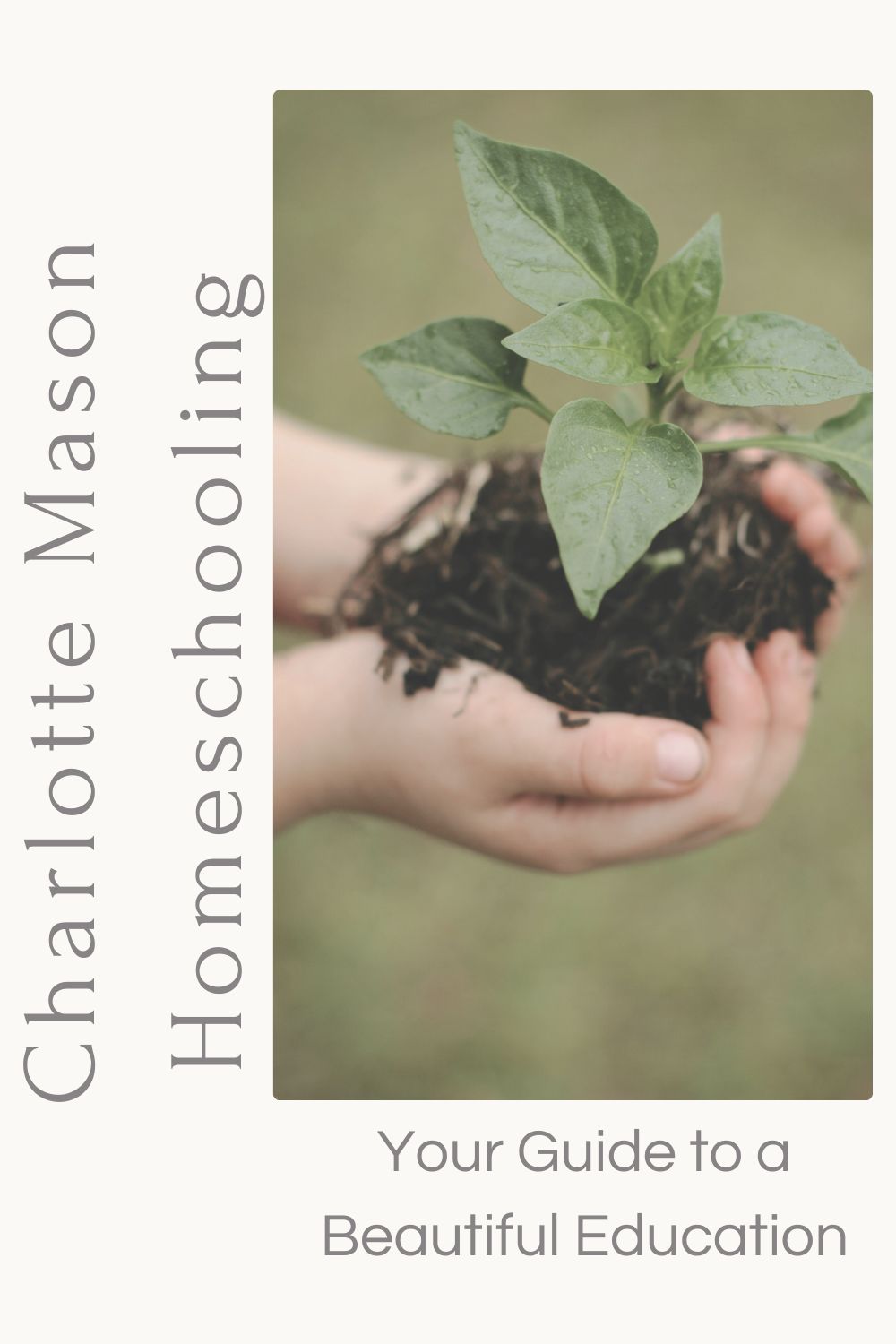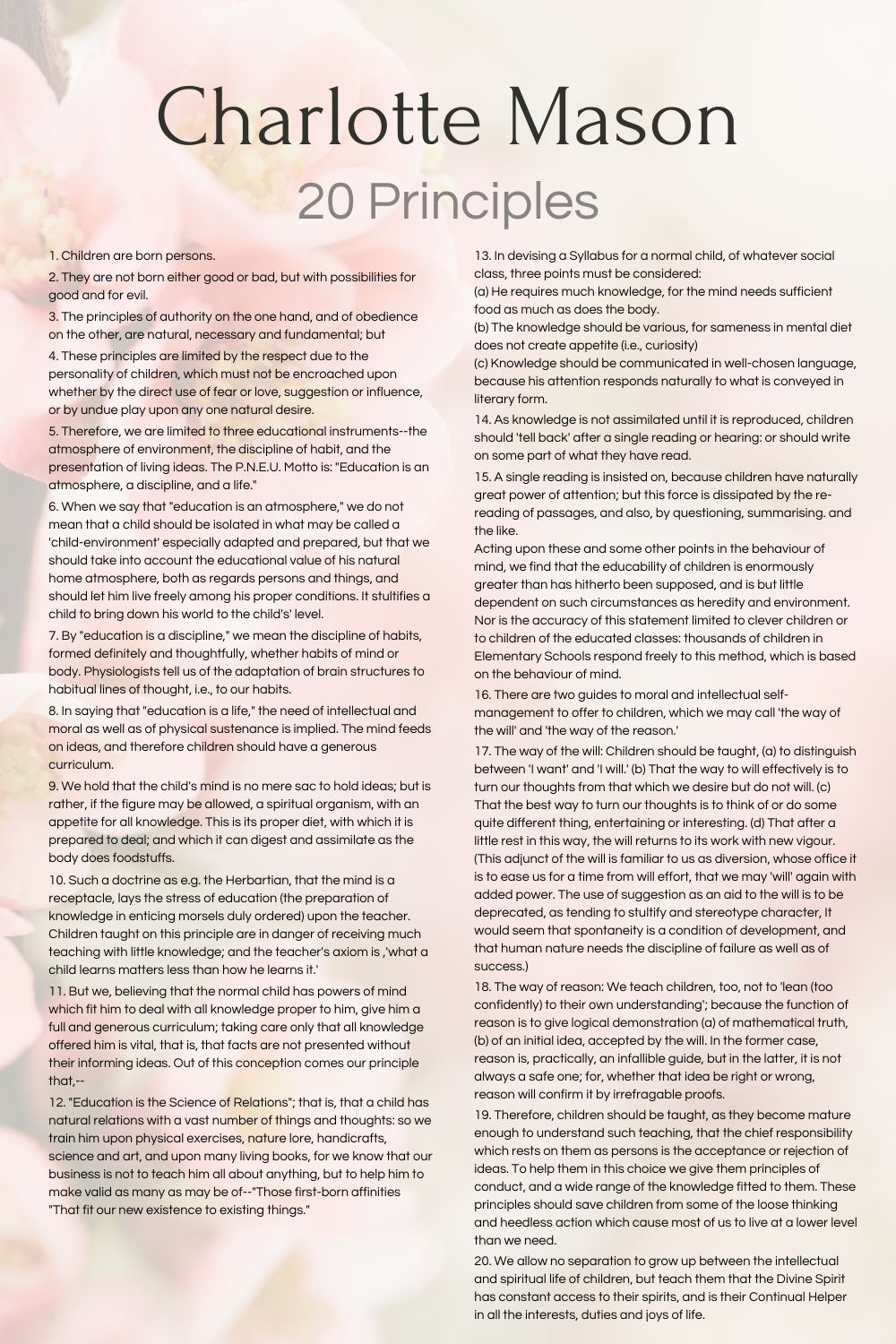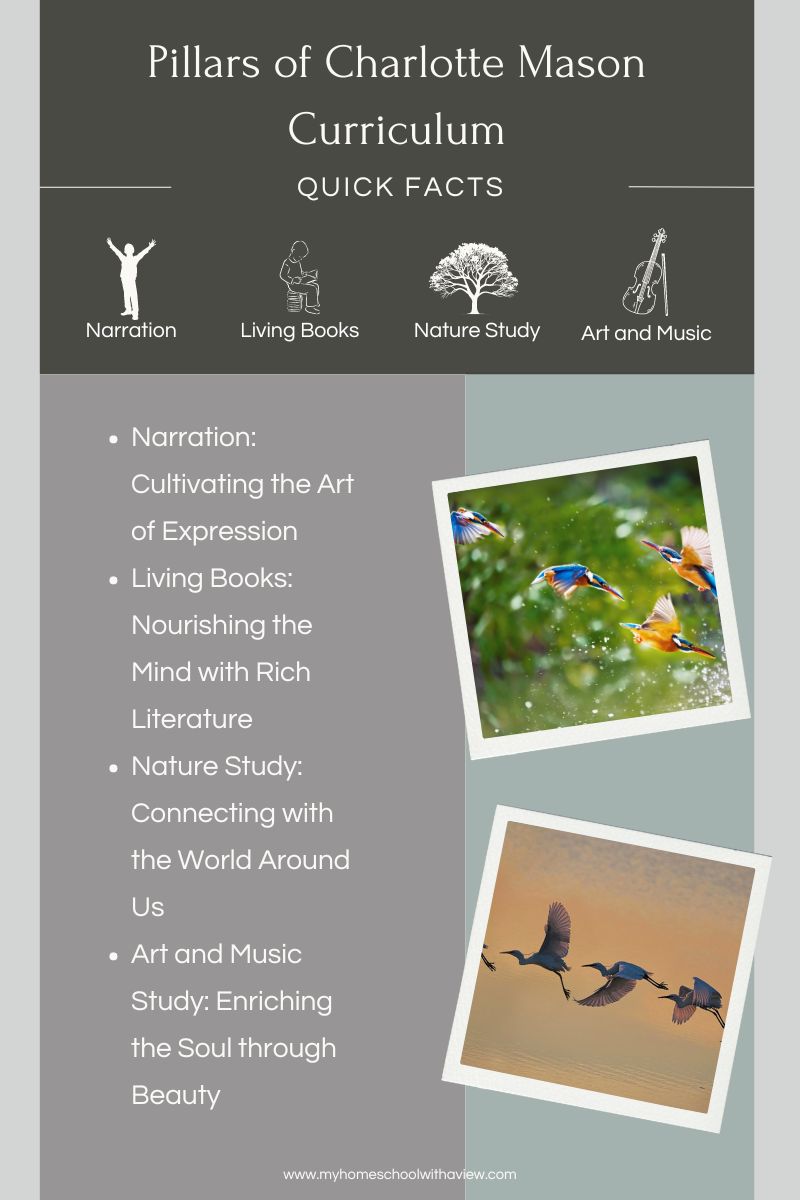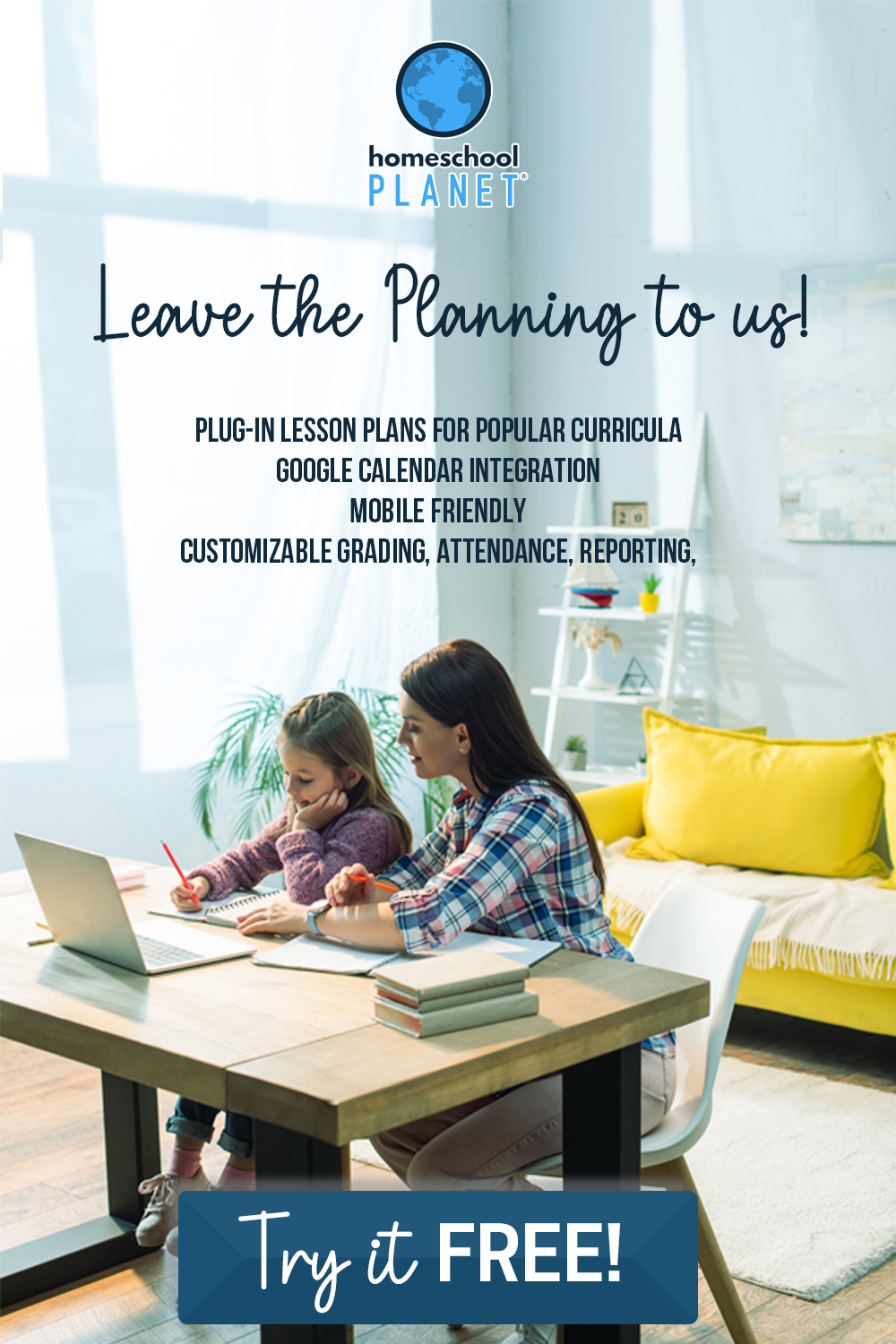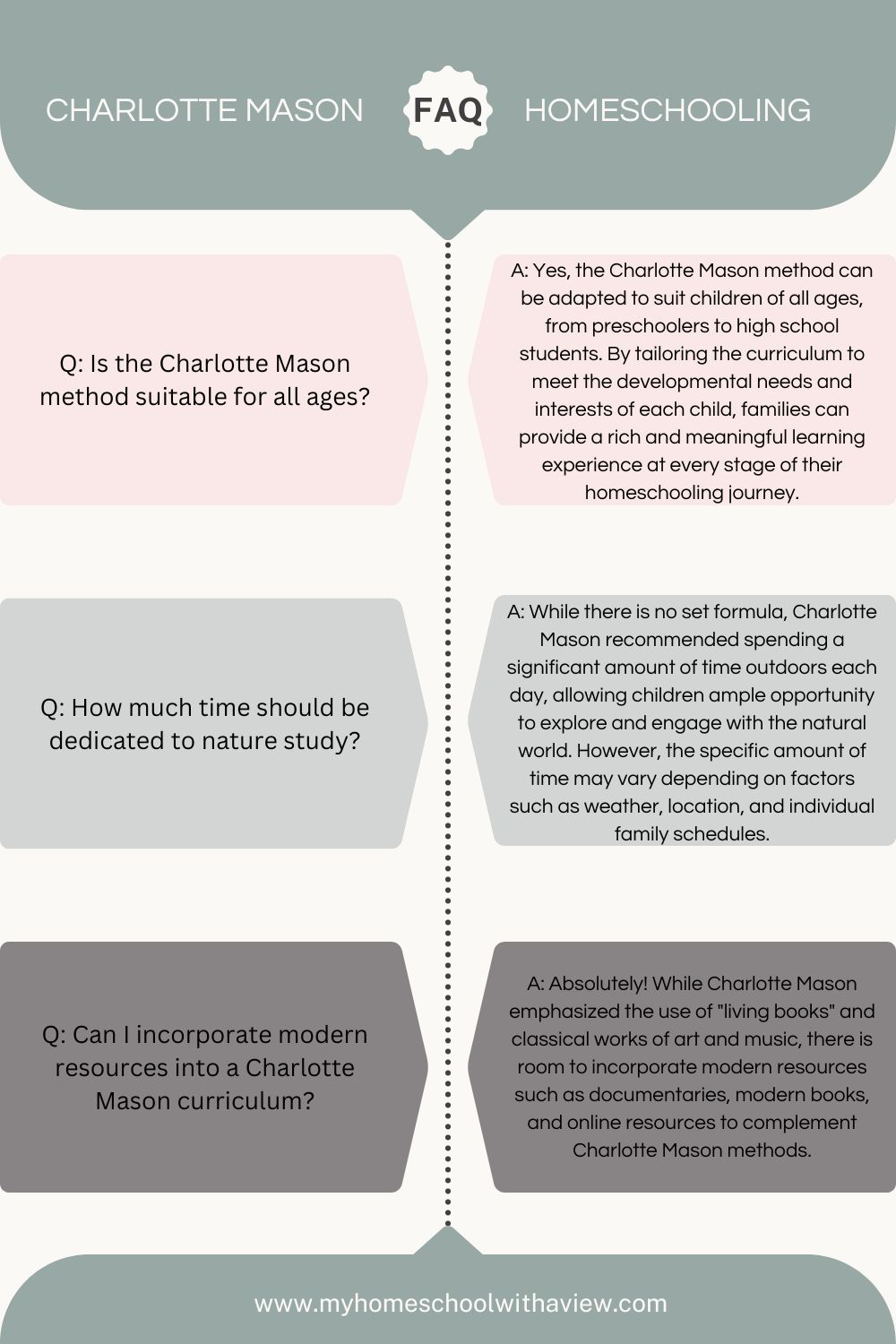This post is all about Charlotte Mason Homeschooling.
This post contains affiliate links and My Homeschool with a View, LLC participates in the Amazon Associates program. If you make a qualifying purchase through our links, we earn a commission at no additional cost to you . Thank you for supporting this site! You can read my affiliate and advertising disclosure here.
The Charlotte Mason homeschooling method has become a wide spread trend over the past ten years. As a second generation homeschooler, I can say I never actually heard about Charlotte Mason homeschooling until I started to homeschool my own kids.
Charlotte Mason homeschooling has become a gem cherished by many homeschoolers. You don’t have to look far to find Charlotte Mason homeschooling groups, co-ops, and even retreats.
In this post we will embark on an exploration through the Charlotte Mason homeschooling principles, curriculum and homeschool philosophy. You will also discover how to find free Charlotte Mason curriculum and resources.
Charlotte Mason Homeschooling Foundations
Who is Charlotte Mason
Charlotte Mason was an early twentieth-century educator from England whose educational theories were considered radical for her time. She advocated for an educational model designed to foster a love of learning in all children, regardless of their social or economic background.
As she developed her educational principles, Charlotte began lecturing and writing extensively. This allowed her methods to endure and spread among modern homeschoolers, who continue to embrace and expand upon her ideas.
The Foundations of Charlotte Mason Homeschool Philosophy
Timeless and transformative, Charlotte Mason’s educational approach captivates families worldwide. Offering a rich tapestry of ideas and practices to cultivate a love for learning.
At its core, Charlotte Mason’s philosophy is built upon a set of enduring principles that shape every facet of education. While she articulated twenty principles, here are the main ideas that encapsulate her philosophy.
Children are Born Persons:
Charlotte Mason believed that children are complete individuals with their own thoughts and interests from birth. They are not empty vessels to be filled with information but rather unique persons who deserve respect and the opportunity to explore their own intellectual and emotional landscapes.
Education is the Science of Relations:
According to Mason, education is about making connections. She emphasized the importance of relationships between different fields of knowledge, between the learner and the subject matter, and between the learner and the world around them. This principle encourages a broad and interconnected curriculum that helps students see the relationships between various subjects.
Habit Training is Essential for Children:
Mason recognized the significance of habits in shaping character and learning. She believed that cultivating good habits, such as attention, obedience, and punctuality, was crucial for a child’s development. Habit training helps students develop self-discipline and moral integrity, which are foundational for lifelong learning and personal growth.
Children Should Have a “Feast” of Subjects:
Mason advocated for a broad and varied curriculum, often referred to as a “feast,” to engage children’s minds and hearts. This feast includes literature, history, geography, nature study, science, art, music, and physical education. By exposing children to a wide range of subjects, Mason believed they would develop a well-rounded and deep appreciation for the world.
From her reverence for living ideas to her recognition of a child’s innate curiosity and potential, these principles lay the groundwork for a holistic and enriching learning experience. Mason’s approach encourages educators and parents to present knowledge in a way that sparks curiosity and passion, rather than through rote memorization or forced learning.
In practice, Charlotte Mason’s methods involve:
- The use of living books: Well-written and engaging texts
- Narration: Having the child retell what they have learned
- Nature Study and the creation of nature journals.
These practices help children connect with the material on a personal level. The goal is to foster a deeper understanding and a love of learning that extends beyond formal lessons.
Charlotte Mason’s legacy continues to inspire homeschoolers. It offers a compassionate and thoughtful approach to education that respects and nurtures the whole child.
The Pillars of Charlotte Mason Curriculum
Related: The Most Comprehensive Guide to Charlotte Mason Curriculum – My Homeschool with a View
Living Books: Nourishing the Mind with Rich Literature
Central to a Charlotte Mason curriculum are “living books” — vibrant narratives that breathe life into learning. Unlike dry textbooks, these literary treasures engage the imagination, ignite curiosity, and instill a love for reading.
Living books are written by authors who are passionate about their subjects, and this enthusiasm translates into writing that is rich, engaging, and often poetic. These books are characterized by their ability to capture the reader’s interest through storytelling, vivid descriptions, and deep exploration of ideas.
Living books cover a wide range of genres and subjects. They might include compelling biographies, novels, and firsthand accounts that bring events to life. Instead of merely listing dates and facts, these books tell the stories, allowing students to form connections and understand their subject area.
Narration: Cultivating the Art of Expression
Through narration, children become active participants in their learning. Early learners start with oral narration. This becomes the base that they will build their writing skills upon in later years.
Oral narration progresses to written narration. In a Charlotte Mason homeschool you won’t see worksheets or essay questions. The philosophy is that strong narrators will become good writers and narration will naturally lead into format writing.
Whether orally recounting a story or articulating thoughts in writing, narration fosters comprehension, critical thinking, and communication skills. Students are empowered to express their ideas with clarity and confidence.
Nature Study: Connecting with the World Around Us
In the embrace of nature, Charlotte Mason encouraged getting out of the confines of the classroom with plenty of opportunities for outdoor exploration and discovery.
From observing the intricacies of a spider’s web to marveling at the changing seasons, nature study lays the groundwork for science studies.
Nature study invites students to develop deep connections of the natural world and cultivates a sense of wonder that extends beyond the confines of four walls.
Art and Music Study: Enriching the Soul through Beauty
Implementing Charlotte Mason Homeschool Philosophy
Creating a Rich and Varied Charlotte Mason Curriculum
Designing a Charlotte Mason-inspired curriculum involves curating a diverse array of resources that align with her principles while catering to the unique interests and abilities of each child. From literature selections to nature study materials, the key lies in offering a rich tapestry of experiences that ignite curiosity and foster a love for learning.
Cultivating a Habit-Forming Environment
Habit formation is the cornerstone of a Charlotte Mason education, laying the foundation for disciplined and joyful learning. By establishing simple yet consistent routines, homeschooling families create an environment conducive to growth, enabling children to develop virtues such as attentiveness, diligence, and responsibility.
Incorporating Outdoor Learning
The great outdoors beckons as a natural extension of the Charlotte Mason classroom, offering endless opportunities for exploration, observation, and discovery. Whether it’s a leisurely nature walk, a sketching session in the park, or a scavenger hunt in the backyard, outdoor education enriches learning experiences and nurtures a deep connection with the natural world.
Nurturing a Living Education
At the heart of Charlotte Mason’s philosophy lies the concept of “living education” — an approach that seeks to cultivate the whole child, nurturing their mind, body, and spirit. By embracing a curriculum rich in living ideas, meaningful experiences, and authentic relationships, homeschooling families foster a love for learning that transcends mere academic pursuit.
Subjects to Include for the Best Charlotte Mason Curriculum
Spreading a feast of varied subjects is pivotol in a Charlotte Mason education. Utilize short lessons and keep in mind that every subject doesn’t have to be done every day. Here is a list of subjects to include when creating the best Charlotte Mason curriculum.
- Literature
- History
- Geography
- Nature Study
- Science
- Mathematics
- Art Appreciation
- Music Appreciation
- Foreign Languages
- Handicrafts
- Poetry
- Bible Study or Religious Education
- Grammar and Composition
- Physical Education
- Citizenship and Plutarch’s Lives
- Recitation and Public Speaking
- Drawing and Painting
Overcoming Challenges and Adapting to a Charlotte Mason Homeschool Schedule
Addressing Common Concerns
While the Charlotte Mason method offers a wealth of benefits, homeschooling families may encounter challenges along the way. One common concern is navigating diverse learning styles.
Children have unique ways of processing information, and it can be challenging to tailor lessons to meet each child’s needs. In every homeschool method it is important to teach the child, not the method.
Another challenge is balancing academic rigor with flexibility. Charlotte Mason’s approach emphasizes a broad and rich curriculum, which can sometimes feel overwhelming.
Families might struggle to cover all subjects thoroughly while allowing enough time for exploration and rest. Setting realistic goals and being willing to adjust the schedule can help maintain this balance.
Regularly reviewing and adapting the plan ensures that it remains both challenging and manageable.
Flexibility and Adaptability
One of the greatest strengths of the Charlotte Mason philosophy lies in its inherent flexibility, allowing families to adapt and tailor the approach to suit their unique circumstances and educational goals.
Whether it’s adjusting pacing to accommodate individual learning needs or integrating modern resources to complement traditional methods, embracing flexibility ensures that the essence of Charlotte Mason’s philosophy remains alive and vibrant in the homeschooling journey.
Managing a Charlotte Mason Homeschool Schedule
Additionally, managing a Charlotte Mason homeschool schedule can present its own difficulties. The method includes numerous activities such as nature study, art appreciation, and narration, which require planning. Parents might find it hard to fit everything into a daily or weekly schedule.
Keeping individual lessons short and creating a flexible yet structured timetable can alleviate this issue. Modifying the schedule as needed can make the process smoother and more enjoyable for both parents and children.
Length of Lessons in Charlotte Mason Home Education
Charlotte Mason advocated for short, focused lessons tailored to the age and developmental stage of the child. For younger children, ages 6 to 9, lessons typically last about 15 to 20 minutes. This approach helps maintain their attention and prevents fatigue, allowing them to engage fully with each subject.
As children grow older, the length of lessons gradually increases. For ages 10 to 12, lessons might extend to 20 to 30 minutes. This incremental increase respects their growing capacity for sustained attention and more complex thinking.
For older students, ages 13 and up, lessons can be 30 to 45 minutes long. These longer sessions enable deeper exploration of subjects and more advanced studies. However, even at this stage, the emphasis remains on maintaining a high level of engagement and avoiding overly prolonged periods of concentrated study.
Resources for Charlotte Mason Homeschoolers
Charlotte Mason Books
There are many Charlotte Mason books and resources available to help you become more familiar with Charlotte Mason homeschooling.
These invaluable resources provide homeschooling families with a roadmap to navigate the vast terrain of Charlotte Mason’s educational philosophy.
Free Charlotte Mason Curriculum
One of the biggest benefits of the Charlotte Mason method is that it is easy to create a free or nearly free homeschool curriculum.
Ambleside Online provides free lists, guides and lesson plans that are updated regularly to reflect new resources.
You can find many of the book selection free in the public domain or at your local library. You can also utilize librivox for free audio books to enrich your free Charlotte Mason curriculum.
Overall, curated book lists and curriculum guides are indispensable tools for those pursuing a Charlotte Mason education. Thankfully you can get this structured yet adaptable framework free.
Online Communities and Support Groups
Connecting with like-minded homeschool families through online communities and support groups can be a source of encouragement, inspiration, and practical advice.
Whether it’s sharing curriculum recommendations, exchanging ideas for nature study, or seeking guidance on overcoming challenges. The camaraderie found within these communities enriches the homeschooling experience and fosters a sense of belonging.
The Beauty of a Charlotte Mason Homeschool Philosophy of Education
In embracing the Charlotte Mason philosophy, homeschool families embark on an adventure characterized by curiosity, wonder, and a deep appreciation for the art of education.
Through living books, narration, nature study, and the cultivation of beauty, children are empowered to become lifelong learners, equipped with the tools to explore the world with curiosity, creativity, and compassion.
FAQ about Charlotte Mason Homeschooling
Q: Is the Charlotte Mason method suitable for all ages?
A: Yes, the Charlotte Mason method can be adapted to suit children of all ages, from preschoolers to high school students. By tailoring the curriculum to meet the developmental needs and interests of each child, families can provide a rich and meaningful learning experience at every stage of their homeschooling journey.
Q: How much time should be dedicated to nature study?
A: While there is no set formula, Charlotte Mason recommended spending a significant amount of time outdoors each day, allowing children ample opportunity to explore and engage with the natural world. However, the specific amount of time may vary depending on factors such as weather, location, and individual family schedules.
Q: Can I incorporate modern resources into a Charlotte Mason curriculum?
A: Absolutely! While Charlotte Mason emphasized the use of “living books” and classical works of art and music, there is room to incorporate modern resources such as documentaries, modern books, and online resources to complement Charlotte Mason methods. The key is to ensure that these resources align with the principles of living education and promote a love for learning.

